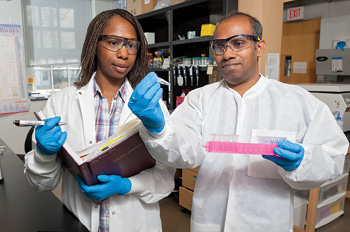Test may speed disease detection

RESEARCH | A research team led by David W. Colby, assistant professor of chemical and biomolecular engineering, has developed a novel technology that could allow for early testing of such neurological diseases as Huntington's and Alzheimer's.
Colby is co-author of a paper published recently in the Journal of Biological Chemistry that suggests protein misfolding may occur early in the development of Huntington's disease. The researchers developed a novel technology to detect the misfolded protein, huntingtin, in laboratory mice at 11 weeks of age, more sensitively than traditional histology methods, which don't reveal large inclusions until much later, at about 78 weeks.
Huntington's disease is one of several neurological diseases, such as Alzheimer's disease or prion disease, associated with proteins that fold into abnormal structures.
"Testing of experimental therapies is slow and expensive, given the time it takes for a misfolded protein to appear in a form detectable by traditional methods," Colby says. "We believe that the [new technique] can speed up this initial testing process and push promising therapies to clinical trial faster."
Co-authors of the research study include postdoctoral fellow Sharad Gupta and research specialist Shy'Ann Jie, both of UD.





